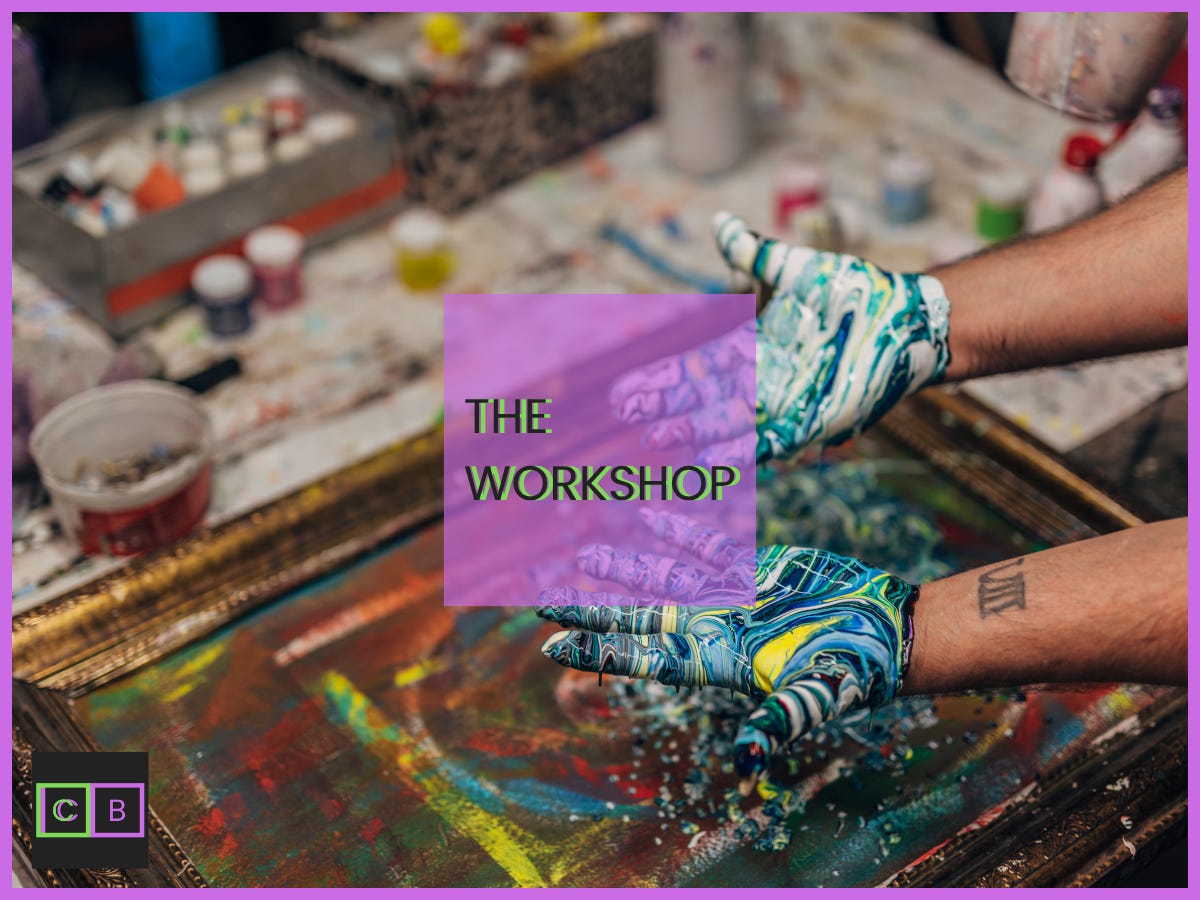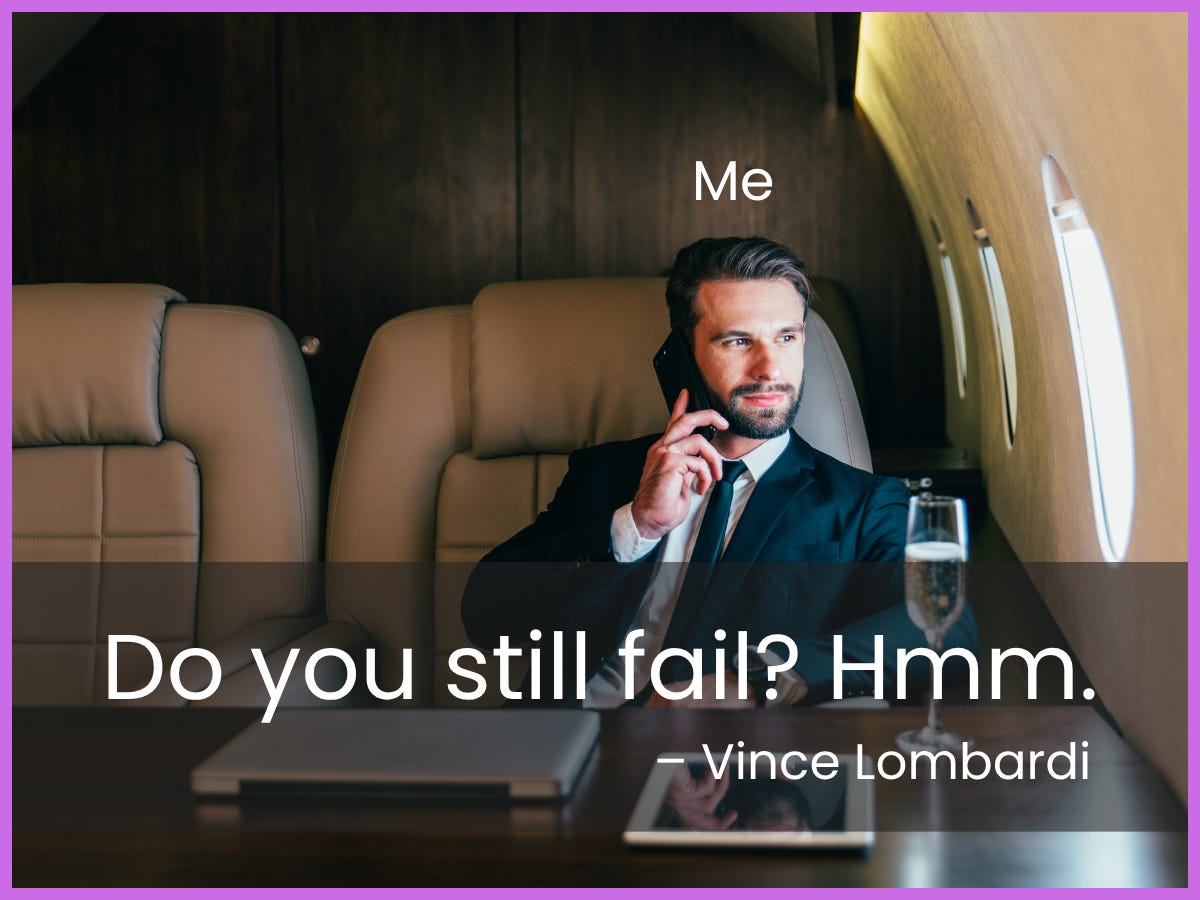Stop Embracing Failure. Start Causing It.
How humblebrag culture is quietly sabotaging creative founders
Welcome to The Workshop–a weekly series with tips, lessons, and tools from the messy, behind the scenes side of building a creative business.
This post is free, but most issues of The Workshop are for paid subscribers. The Weekly Build, our weekly advice series for creative entrepreneurs, is always free. You can receive both in your inbox here:
I failed once and I embraced the hell out of it.
Now? I own a jet. ✈️
And I don’t fail anymore.
Last week, I went to Istanbul.
For business. 💼
I conquered unified field theory and met my fiancée.
I used to not marry models or crush it in Turkey.
Now I do both. 💍 👊
All because of this one thing I learned.
What was it?
Man, it’s this whole complicated thing.
DM your email address and I’ll send you my entire system…
Bad Theater
I love a good LinkedIn humblebrag.
But this kind of (only slightly exaggerated) post is damaging for creative founders just getting started.
Humblebrags program us to think our story should follow the hero’s journey. Start strong. Fail. Learn from it. Rise above. Succeed. Brag post. Package and sell what you learned.
If our story doesn’t follow that formula? We’re actually failing. Not humblebrag failing. Close-up-shop-and-apply-for-jobs failing. I’ve fallen into this trap as a founder many times and it sometimes still pulls me in.
But humblebrags don’t just lead to unhealthy comparisons. They also diminish the role of failure in building a business. They limit failure’s time frame and brush past its impact. In the hero’s journey, failure exists to highlight greatness that the hero had inside them all along. It has a beginning and an end. When failure ends, the story ends. We imagine the hero living the rest of their days failure-free.
That’s not just bad theater. It’s a poor representation of what building a business looks like behind the scenes. If you’re building something meaningful, failure never ends.
But don’t let that discourage you! You don’t want failure to end.
The most successful businesses in the world fail every day. They’re constantly pushing the boundaries of what’s possible, knowing that they’re going to fail at most things they try. That’s why they’re successful.
So it might be time for you to rethink your relationship with failure. It’s not something to react to or worry about. It’s a tool for your success. Maybe reframe it this way:
Successful founders don’t embrace failure. They cause it.
Launch Day Failure
Let me show you what that looks like from behind the scenes at The Creative Build. This series that you’re reading right now—The Workshop—failed last week.
Last Monday was the first time that I tried to monetize content with a paywall. Like ever. In my entire 25-year career.
I spent three days writing that first monetized post. Most of it was just thinking and taking notes on my couch. Had you been seated next to me, you would have assumed I was mostly napping. Maybe waking up every 15 minutes to write in a dream journal.
The LinkedIn experts said that my first monetized post had to provide value. I had to deliver something that my audience would be willing to buy. So I spent 24 hours building and designing a tool. A guide to help creative founders interview customers and sketch what they learn. It’s something I would have loved when I first started building businesses but with a twist for creative founders.
Here’s a link to the tool if you’re curious. No email required.
I showed the tool to a friend who has decades more experience doing this sort of thing. “Man, that’s going to kill on Substack. You’ll have 100 subscribers by lunch.”
So I made it the feature of my post. Wrote around it. Teased it in the title and the intro. Linked it in the text.
And what happened on the big day? Nothing. I got one click. No engagement or new subscribers.
I tried giving it away in my Linktree. I got a few more clicks but no downloads. Nobody who saw it wanted it.
My tool had failed.
So what’s the big lesson from this failure? What revelation will propel me from the ashes?
I don’t know.
Read that again. 👆
I’m starting a business, not living the hero’s journey or writing a LinkedIn humblebrag. “I don’t know” is an acceptable answer—and the most common one.
Evolving The Workshop
So my first go at monetization didn’t work. I don’t know why but I have three leading hypotheses:
Maybe readers don’t need it.
Maybe they need it but don’t know they need it.
Maybe it’s not about the tool and I’m trying to force my entire university entrepreneurship course into weekly, 5-minute newsletter posts. I mean the math on that is wild. At the rate of one 5-minute lesson per week, it would take 11.5 years to cover the same ground that I do in a semester.
For now, I’m leaning into that last one. I still like the tool. I think I actually pushed the purpose of this publication to failure by trying to do too much. In response, I’m adjusting The Workshop to be something simple and more true to what a workshop actually is.
Workshop: An open, messy place where work gets done.
Maybe there’s something you can learn from seeing my mess or the messes others face in the process of building their business.
Or maybe you’ll find comfort in seeing that you’re not alone in your own mess.
So in addition to learning something about failure, you’re reading the first Workshop issue with that purpose.
What happens if this new direction fails? I’ll try another one. And I’ll keep trying until I find one what works.
The Founder’s Journey
The hero’s journey is alluring.
But founding a business isn’t theater. If it was, the audience would walk out during act one. Behind the scenes is always messy and sometimes boring. Cue me nap writing my post last week.
Yes, failure plays a role. But it’s not the hero’s foil. Failure is the main character.
It usually doesn’t result in eureka moments or breakthrough outcomes. Sometimes it doesn’t teach you anything at all.
When it does, it nudges you, daily, quietly, toward an almost imperceptible reduction in uncertainty.
In the moment, failure is all you feel. Only later—sometimes years later—can you see what it moved in you.
Your lessons? They’re mostly irrelevant to other founders. You’re building something that’s uniquely you serving customers who are uniquely them. You can’t package and sell what you learned. Anyone who tells you otherwise is literally selling you something.
But you can celebrate that movement.
Not because it has value for other founders. Because it has value for you.
Because you tested the boundaries of what’s possible for you.
That’s what I want to see in your humblebrag. Regardless of how the story ends.
Have any “ah ha” moments or your own failures to share? I’d love to hear them.
Reply to this email or leave a comment. Your insight might even shape a future edition of The Workshop.
New to The Creative Build?
I publish two posts a week to help creatives turn their talent into thriving, independent businesses:
The Weekly Build (Fridays): Advice, mindset, confidence
The Workshop (Mondays): Tools and frameworks you can put to work
Subscribe to follow along.



